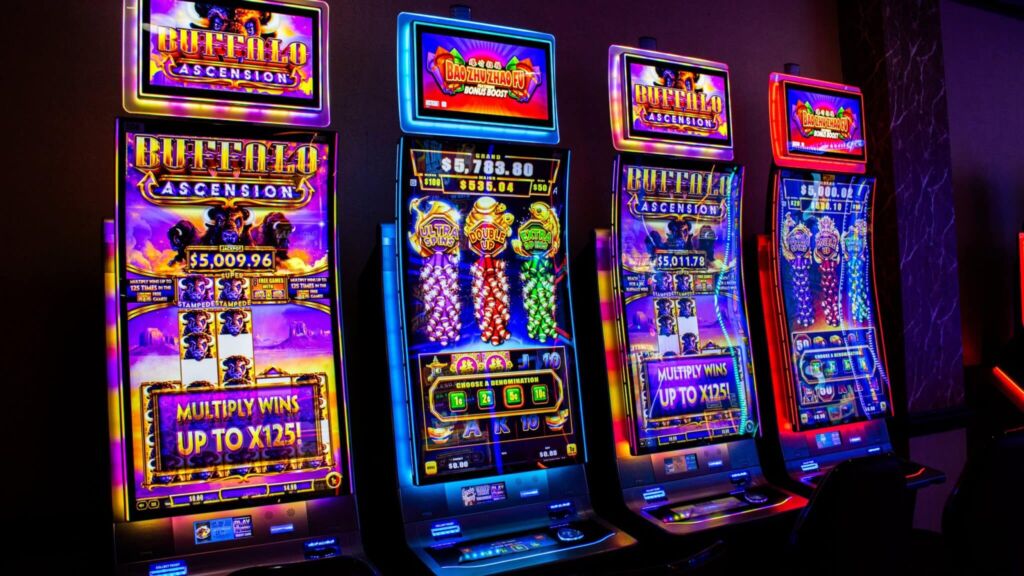Understanding slot machine algorithms is key for anyone exploring the casino environment, as it reveals the links between the flashy visuals and actual chances, enhancing strategic insight into the games.
Decoding Slot Machine Algorithms: More Than Just a Spin
Slot machines, whether classic or digital, rely on intricate algorithms to create random results. These Random Number Generators (RNGs) form the backbone ensuring fairness and unpredictability in slot games. By comprehending these mechanisms, players can gain a deeper insight into the game, moving from mere luck to a strategic understanding. Both novices and seasoned players should familiarize themselves with how RNGs and slot algorithms operate to play wisely and responsibly.
Exploring the Function of Random Number Generators (RNGs)
Every slot machine uses RNGs, advanced software that constantly generates number series at high speed, even when idle. Think of it as a perpetual lottery machine picking number sequences. When the spin button is hit, it's like capturing a frame of numbers happening at that instant, which then aligns with specific reel outcomes. This number corresponds to certain symbols on the reels, deciding the results of the spin. A vital feature of an RNG is its randomness ; each creation is independent of previous results, guaranteeing that each spin remains uncertain and unrelated to prior spins.
Today's slot machines employ Pseudo-Random Number Generators (PRNGs) , algorithms that produce sequences seeming random, though they are deterministic. Unlike RNGs which might use unpredictable natural processes, PRNGs use mathematical methods to simulate randomness. Imagine following a meticulous recipe that gives a series of numbers appearing random. Although PRNGs have predetermined formulas, they are designed to pass stringent tests for randomness, making them practically similar to true RNGs for gaming purposes. These assessments, conducted by unbiased auditing bodies, verify that number patterns and distributions lack detectability. The complexity and efficacy of these PRNGs are crucial to preserving the perceived fairness and reliability of slot games from both the players' and regulators' perspectives. Various PRNG types exist, differing in their intricacy and mathematical traits, but the aim is always to create high unpredictability and neutrality.
How Algorithms Shape Rewards and Probabilities
Slot game algorithms extend beyond generating randomness; they are intricately fashioned to handle payout percentages and probabilities . The randomness of outcomes and their recurring instances are carefully orchestrated by these algorithms, directly affecting how frequently players win and the magnitude of winnings. Through calculated numerical design, symbols on reels are assigned specific likelihoods. Picture each reel having multiple stops, but not equal probability; fewer stops might lead to rare symbols while common ones are more frequent. This control over frequency helps define the game’s volatility and its Return to Player (RTP) percentage .
The RTP percentage , or Return to Player percentage, indicates the anticipated return of all bets over countless spins, typically in the billions, presented as a percentage. For example, a 96% RTP means theoretically $96 is returned for each $100 wagered over time. It’s critical to note that RTP represents an average over the long term, not an assured return for any single play session. Short-term experiences can deviate because of RNG's inherent randomness, allowing for potential larger wins or complete losses despite the stated RTP. Although higher RTPs suggest better value over time, the margin still favors the casino. For online slots, RTP information is often available in the game details, serving as a guiding factor for players evaluating potential returns.
Volatility , also called variance, expresses the risk associated with slot games, describing how winnings are spread throughout gameplay. High volatility games bring bigger, occasional payouts coupled with potential dry spells, appealing to players seeking high risks and rewards. Conversely, low volatility slots yield regular, smaller wins, ideal for those preferring prolonged gameplay and steadier returns. This dynamic forms through deliberate algorithm choices, affecting player experience and risk appetite. For instance, players with tight budgets may favor low volatility to extend play, while thrill-seekers might opt for high-risk, high-reward volatile games.
Interpreting Paytables and Symbol Weighting
The paytable is an accessible reference that provides players with details on all symbol combinations that result in winnings and their consequent payouts. In essence, it is the instruction manual of the game, describing what can be achieved. While it outlines payoff mechanics, the underlying probabilities and symbol weights that drive the slot's RNG remain hidden. The reels serve not just as visuals but as representations of probability where higher-weighted symbols appear more often in the RNG’s outputs. The delicate balancing of payouts and symbol frequencies ultimately defines the game's core statistics.
Seasoned gamblers master the art of reading paytables for smarter game selection. For example, a paytable with large variations in payouts suggests a high volatility game, where significant rewards come less often. In contrast, evenly spread paytables generally point to lower volatility, offering steady wins across different symbols. Without knowing invisible symbol weights and algorithms, players can only make educated estimates about real odds. Though informative, the paytable is just part of the equation. Regulatory bodies ensure the fairness of these algorithms through rigorous tests aligned with promised RTP and volatility, safeguarding fair play and genuine winning prospects.
The Concept of House Edge and Why Casinos Maintain an Upper Hand Long-Term
Understanding the house edge is crucial for grasping how casinos profit from games like slots. This edge is the statistical advantage that keeps the house profitable over time. In slots, this is achieved through the RTP (Return to Player) percentage, which is always less than 100% . This setup ensures that although individuals can hit jackpots, the casino inevitably makes money in the long run. Imagine a casino as a business offering fun and excitement, where the house edge is the backbone of its revenue model—guaranteeing future gains.
Consider a slot game with a 95% RTP ; this implies a house edge of 5% . What it means is, generally, for every $100 placed in bets, the casino retains $5 , while $95 goes back to players as winnings. This is just an average calculated over numerous spins. Although 5% might seem minuscule, it quickly adds up, becoming a significant income stream when considering the constant operation of countless machines. Players must recognize that despite the thrill of winning, the mathematical advantage is always with the casino, which is why it's essential to gamble responsibly and within one's financial limits, seeing it as entertainment rather than a money-making venture.
Dispelling Myths and Misconceptions About Slots
Slot machines are surrounded by tales and misunderstandings, often arising from a lack of knowledge about how they work. Many gamblers fall for the misconception, thinking that a machine is 'due' for a win after losses or believing they can predict outcomes based on past spins. This belief, known as the Gambler’s Fallacy , mistakenly assumes randomness will self-correct. In reality, each spin is random and independent, like tossing a coin – landing heads multiple times doesn't alter future flips' outcomes. There are no 'hot' or 'cold' machines, only statistical variances within expected returns. A slot might payout multiple wins in close succession merely by coincidence, not as a part of a predictable pattern.
Another prevalent myth is the idea that casinos can manipulate the algorithms to deceive players. While speculation and conspiracy theories exist, reputable casinos are closely regulated, with stiff penalties for any foul play. Slot machine algorithms undergo rigorous testing and certification by independent bodies to ensure fairness and compliance with the declared RTPs. These impartial agencies use advanced test methods to check the accuracy and integrity of RNGs, safeguarding the gambling industry's credibility and players from unfair practices. While the casino's profit model relies on the house edge, each game is transparently fair according to its mathematical structure. Fairness here doesn't mean equal win chances, but assurance that games work as intended.
Approaches to Slot Play: Setting Realistic Expectations and Managing Funds
Given the inherent design and house edge of slot games, no strategy promises wins. Any claims of foolproof slot strategies are usually based on misunderstandings of how these machines work and are largely ineffective. Tactics like betting schemes, spin timing, or relying on ‘lucky’ machines fall into this category. What players can do is indulge in smart gambling practices: managing their bankroll, selecting games wisely, and knowing their risk tolerance. These approaches aren't about overriding the house edge but are aimed at elevating enjoyment while maintaining financial prudence.
Managing your bankroll is about setting a gambling budget and adhering to it, win or lose. This discipline is central to responsible gaming. Before playing, decide on the maximum you're comfortable losing – this should be disposable income, not funds meant for essentials. Also, determine a cap for both session duration and expenses. Stop once these limits are hit, regardless of your current standing. Consider gambling as a leisure expense, akin to any other form of paid entertainment. Avoid using money ear-marked for critical expenses such as housing or groceries.
Choosing your game can enhance your gambling experience. Opting for games with higher RTP percentages might slightly improve your odds, yet the house edge persists. While high RTPs don't assure short-term gains, statistically, they could yield better returns over extended periods. Also, assess game volatility: low volatility offers frequent, smaller wins, whereas high volatility caters to players willing to take risks for significant rewards. Decide what suits you better — the joy of chasing a big prize or the satisfaction of steady, smaller wins. Explore various themes, features, and bonuses to keep things fresh but remember, game selection, while enriching the experience, cannot alter the mathematical basis of the house edge.
Responsible Gaming and Algorithm Insights
Learning about slot game algorithms isn't about devising a way to outsmart the system, because that's mathematically improbable over time. It's intended to encourage a savvy, responsible gambling attitude. Understanding elements like RNGs, RTP, house edge, and volatility equips players to view slots as a paid amusement, not as consistent income streams. Think of it like attending a concert or a movie — you're purchasing the experience, not a financial return. Responsible gambling means setting realistic expectations, recognizing that the house always has the upper hand, and keeping gambling within emotional and financial boundaries. It's about making informed decisions and controlling gambling behaviors, including recognizing problem signs and seeking assistance if necessary.
For those worried about their gambling becoming problematic, several resources are ready to offer aid and guidance. Organizations focused on responsible gambling provide support, counseling, and tools for maintaining healthy gambling practices or addressing gambling issues. They offer discreet, no-cost support to players and family members. Raising awareness around slot algorithms and responsible gambling is vital for a fair, safe gaming environment. This involves casinos being open about game statistics like RTP and volatility and educating players on the gaming mechanics at play.
Final Thoughts: Embrace Smart Gambling
Taking a closer look at how slot machines work reveals the complex formulas and computer operations behind these well-loved gaming machines in casinos. While many might be drawn to these games due to the prospect of fast wins and the thrill of playing, gaining a deeper understanding of how the systems work sheds light on the element of chance involved. Such understanding can shift the perspective from believing in luck or myths to seeing it through the lens of probability and how games are programmed. Whether you're new to gambling or have years of experience, knowing about Random Number Generators (RNGs), Return to Player (RTP) rates, and the casino advantage isn't about finding a way to beat the odds; instead, it's about approaching gambling in an informed and balanced manner. It's about prioritizing entertainment, staying within your limits, and having realistic expectations regarding the chances involved. This knowledge enables players to enjoy slots as a fun pastime with a full grasp of how the games work. In the years to come, slot machines are likely to feature even more advanced technology, perhaps integrating skill-based elements or more interactive features, making it crucial for players to continue educating themselves and practice responsible gaming. As technology evolves, the systems controlling slot games will become more intricate, necessitating ongoing learning and awareness initiatives related to responsible gambling.
External Resources:



